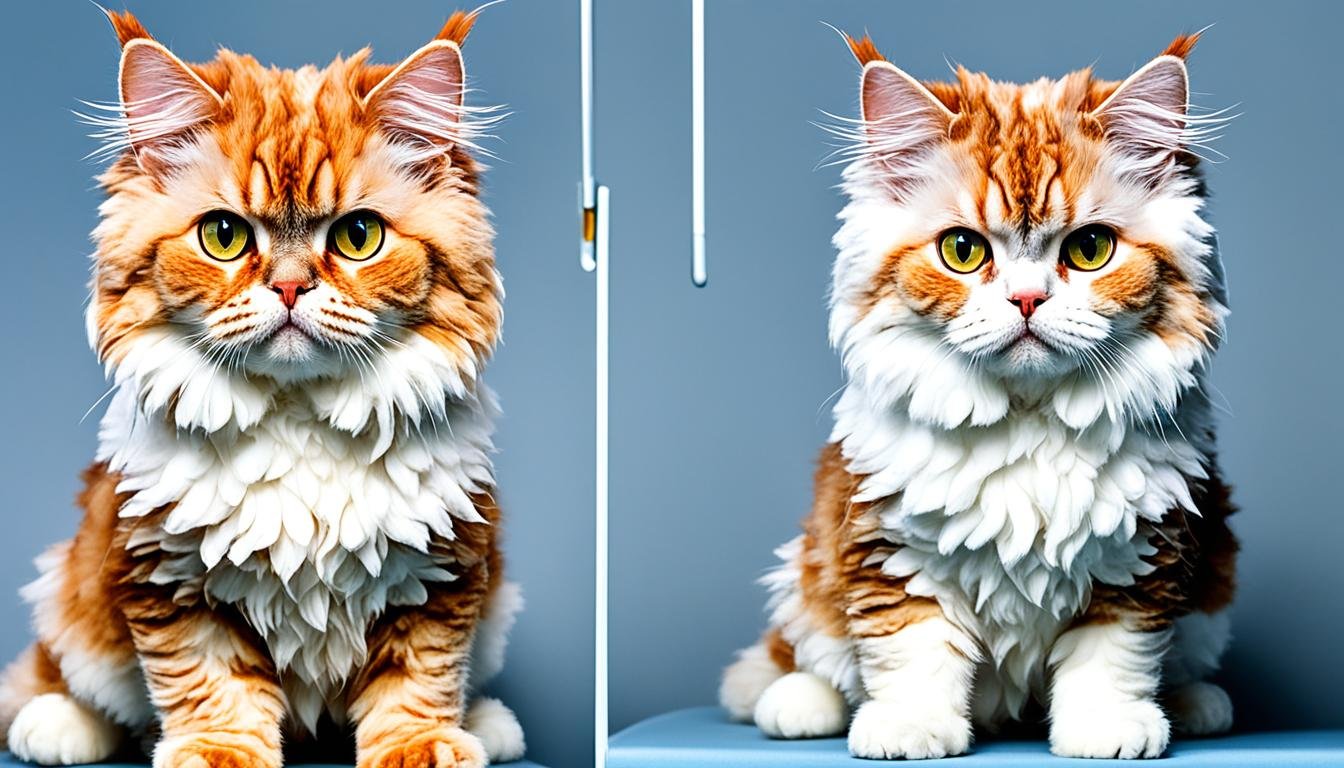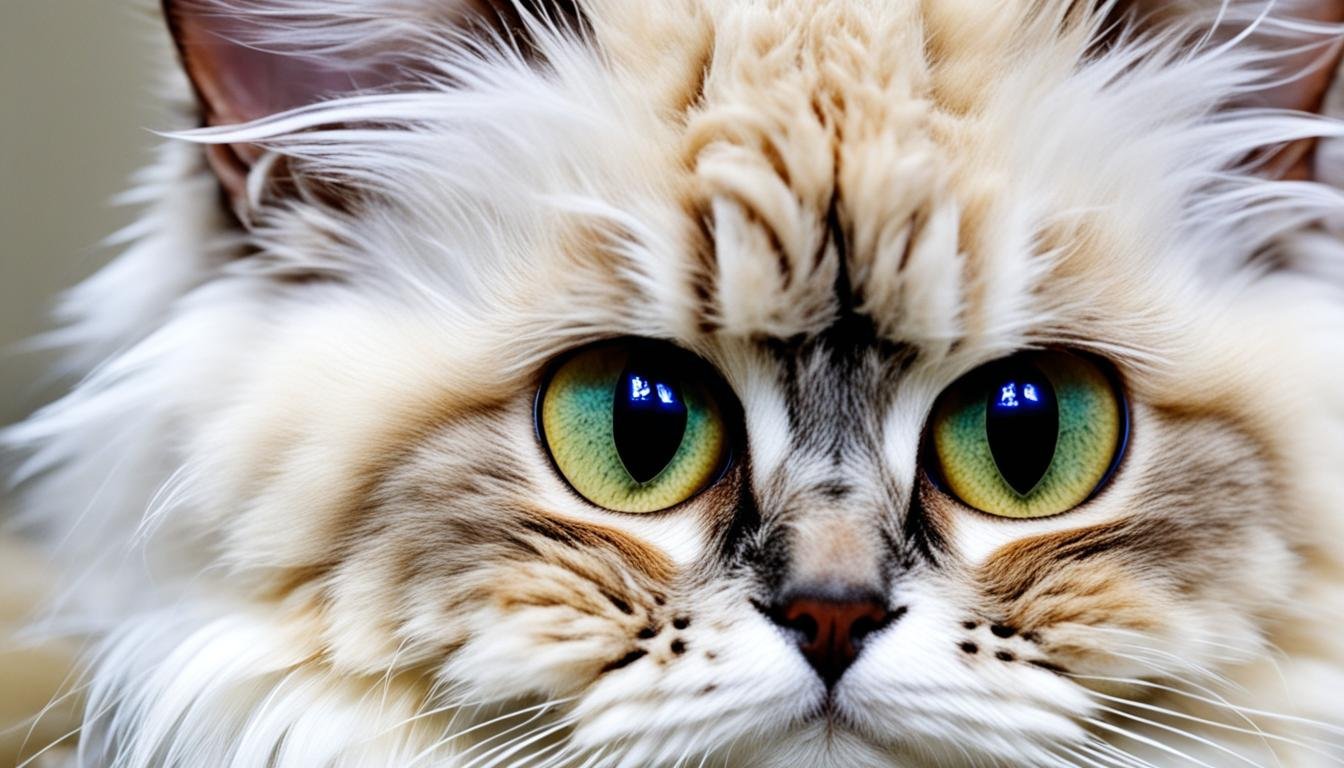Selkirk Rex cats are becoming more popular in the U.S. They are known for their loving nature and their curly fur. But, it’s important for owners to know about the health issues they might face. These cats can get certain health problems, just like any other breed. Knowing about these issues can help keep your cat healthy and happy.
Regular vet visits are key to keeping an eye on your cat’s health. They help spot diseases early, making sure your cat stays well.
Key Takeaways
- Understanding Selkirk Rex health issues is crucial for pet owners.
- Regular vet check-ups help to identify common diseases in cats.
- Selkirk Rex cats require specific care due to their unique characteristics.
- Awareness of genetic and non-genetic health issues is important.
- Proactive care can improve the quality of life for Selkirk Rex cats.
Introduction to Selkirk Rex Cats
Selkirk Rex cats are special because of their curly fur. They have round faces and big, expressive eyes. These traits make them look adorable and capture the hearts of many cat lovers.
They are also friendly and love to play. This makes them great pets for many families.
Unique Characteristics of Selkirk Rex Cats
Their curly fur is a result of a natural mutation. This makes them stand out and requires special grooming. Owners need to take care of their coats to keep them healthy and looking good.
These cats love being around people and fit well into family life. They make great pets because of their friendly nature.
Understanding Their Health Needs
It’s important to know about Selkirk Rex health needs. Regular vet visits, shots, and a good diet are key. Owners should watch for any health issues early on.
Feeding them right and keeping an eye on their health can prevent many problems. Spaying or neutering them is also important for their health and responsible pet ownership. This helps them live a long and happy life.
Common Diseases in Selkirk Rex Cats
The Selkirk Rex breed is known for its unique curly fur and playful personality. They are prone to specific health concerns that owners should know about. Knowing about Selkirk Rex genetic disorders and common health issues helps with early interventions. This can lead to a longer, healthier life for these pets.
Genetic Disorders Specific to the Breed
Selkirk Rex genetic disorders can significantly affect their health. One common condition is hypertrophic cardiomyopathy (HCM), a hereditary disease that affects the heart muscle. If not treated, it can lead to serious complications. Early screening is crucial for recognizing cat illnesses before they worsen.
Another issue comes from selective breeding, which can increase the risk of hereditary diseases in cats. Careful evaluation of breeding lines can help reduce these risks. This promotes healthier offspring.
Common Health Issues and Symptoms
Selkirk Rex cats may face various health issues that need attention. Common problems include:
- Obesity, which can lead to diabetes and joint issues
- Urinary tract infections, often shown by frequent litter box visits or straining
- Diabetes, with symptoms like increased thirst, weight loss, and excessive urination
Early recognition of cat disease symptoms is crucial to prevent severe complications. Regular vet check-ups are key to keeping Selkirk Rex cats healthy. They help address any emerging concerns quickly.

| Health Issue | Common Symptoms | Recommended Action |
|---|---|---|
| Hypertrophic Cardiomyopathy | Difficulty breathing, lethargy | Regular heart screenings, veterinary consultations |
| Obesity | Weight gain, decreased activity | Diet management, increased exercise |
| Urinary Tract Infection | Frequent urination, straining | Veterinary evaluation, proper hydration |
| Diabetes | Increased thirst, weight loss | Blood sugar monitoring, dietary adjustments |
Respiratory Conditions to Monitor
Selkirk Rex cats can get respiratory conditions like other cats. They often get feline respiratory infections. It’s important to know about these infections, their symptoms, and how to keep your cat’s respiratory system healthy. Issues like feline herpesvirus and calicivirus can affect Selkirk Rex cats. If your cat shows signs like coughing, sneezing, or nasal discharge, it’s important to act fast.
Understanding Feline Respiratory Infections
Feline respiratory infections can happen to any cat, but Selkirk Rex cats might face special challenges. These infections can start suddenly and need quick action. Look out for signs like:
- Coughing
- Sneezing
- Nasal discharge
- Fever
- Lethargy
Getting your cat treated quickly is key to preventing worse problems. These infections can make your cat very uncomfortable and even lead to serious health issues if ignored.
Preventative Measures for Respiratory Health
It’s crucial to take steps to prevent respiratory issues in Selkirk Rex cats. Using feline health prevention techniques can lower the risk of infections. Here are some important steps:
- Make sure your cat gets the right vaccinations to fight off respiratory viruses.
- Keep your cat’s living area clean and hygienic.
- Take your cat to the vet regularly to check on their respiratory health.
- Try to reduce stress in your home to keep your cat calm.
Following these tips can help keep your Selkirk Rex cat’s respiratory system healthy and improve their life quality.
| Preventative Measure | Effectiveness | Frequency |
|---|---|---|
| Vaccination | High | Annually |
| Environmental Cleanliness | Moderate | Weekly |
| Veterinary Check-ups | High | Biannually |
| Stress Reduction Techniques | Moderate | As needed |
Skin and Coat Problems in Selkirk Rex Cats
Selkirk Rex cats have a unique curly coat. This makes them more likely to face certain cat skin conditions. It’s important for owners to know about these conditions to keep their cats happy and healthy. Issues like allergies, dermatitis, and fungal infections can happen. Regular vet visits are key to keeping their feline dermatology in top shape and handling any problems quickly.
Common Skin Conditions
Selkirk Rex cats often deal with specific skin issues that can impact their health. Here are some common problems to watch out for:
- Allergies – These may show redness, itching, or hair loss. Finding out what causes the allergy is crucial for treatment.
- Dermatitis – This often comes from irritants and leads to inflammation and discomfort.
- Fungal Infections – Strange coat conditions could mean a fungal infection, needing quick vet care.
Caring for Their Unique Curly Coat
Dealing with Selkirk Rex coat issues means knowing how to care for their curly coat. They need special attention to avoid matting and skin infections from neglect. Here are some key cat grooming tips:
- Regular Brushing – Brushing them weekly helps get rid of loose fur and prevents tangles.
- Bathing – Bathing them now and then with cat-safe products keeps their coat healthy.
- Checking for Irritations – Checking often for skin problems helps catch them early.
By focusing on good Selkirk Rex coat care and knowing what these cats need for grooming, owners can make their pets’ lives better.

| Skin Condition | Common Symptoms | Treatment Options |
|---|---|---|
| Allergies | Itching, redness, hair loss | Avoid allergens, antihistamines |
| Dermatitis | Inflamed skin, itching | Topical ointments, remove irritants |
| Fungal Infections | Unusual coat texture, lesions | Antifungal medications, veterinary intervention |
Dental Health Concerns
Keeping your Selkirk Rex cat’s teeth clean is key to their health. Cats, like humans, can face dental problems that hurt their quality of life. By paying attention to their oral health, you can stop these issues before they start. This also encourages better habits.
The Importance of Dental Hygiene
Good dental care stops cats from getting periodontal disease. This disease can cause pain, infections, and even tooth loss. It makes eating hard and can ruin a cat’s life. Regular vet visits help spot problems early. Dental cleanings can prevent these issues.
Common Dental Problems in Selkirk Rex Cats
Selkirk Rex cats have dental issues that owners should watch for. These include:
- Tooth resorption: A painful condition where the body’s own cells dissolve tooth structure.
- Gingivitis: Inflammation of the gums commonly associated with plaque buildup.
- Bad breath: A potential indicator of underlying dental issues.
Look out for signs like eating problems, drooling a lot, and acting differently. These could mean dental issues. Treatments depend on what the problem is. They might include cleanings, removing teeth, or medicine. By caring for your Selkirk Rex’s teeth, you can prevent these problems.
| Common Dental Problems | Signs to Watch For | Treatment Options |
|---|---|---|
| Tooth Resorption | Painful chewing, visible tooth loss | Dental extraction, pain management |
| Gingivitis | Swollen gums, bad breath | Dental cleaning, antibiotics |
| Periodontal Disease | Loose teeth, difficulty eating | Dental scaling, periodontal surgery |
Knowing and dealing with dental problems in Selkirk Rex cats can make their life better and longer.
Our summary on Selkirk Rex’s health covers key points for their care. It’s important to know about diseases they might get, like genetic and breathing problems. Regular vet visits help spot and treat health issues early.
As a Selkirk Rex owner, you play a big role in their health. Taking steps to prevent problems and watching their health closely is key. This way, your cat can live a happy life and you’ll grow closer.
Knowing about health issues and how to handle them helps pet owners protect their Selkirk Rex. By being proactive, you can make sure your cat stays happy and healthy. Let’s all do our best to give our cats the best life possible.

